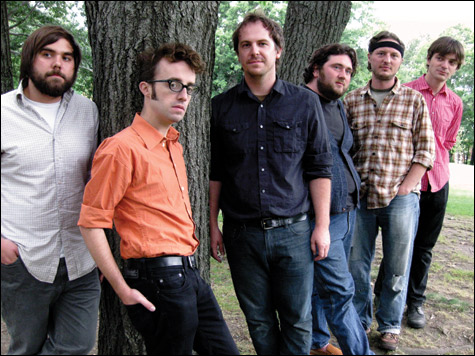
SHAME CHANGER: “It took me a long time to convince myself that everything I was doing wasn’t totally embarrassing,” says Ryan Walsh (third from left). |
When I go bowling with bands, it’s usually to extract them from their natural habitat and place them in a controlled environment for study. Although not exactly sterile, a bowling alley provides a setting wherein communal fun is rigorously tested by individual ambitions — ideal for band observation. In the case of my recent bowling date with Hallelujah the Hills, though, my aim was true. I just wanted to bowl.Our teams were the Rhythm Section (cellist and guitarist David Bentley, multi-instrumentalist and recordist Elio DeLuca, bassist Nicholas Ward, and drummer Matthew Glover — erstwhile of Lights) versus (name not our choice) the Divas (myself, horn player Brian Rutledge and big HTH cheese Ryan Walsh). No wagers were made; the usual competitive machismo that energizes bowling (or ping-pong) seemed quelled by an aura of unity. When Walsh slipped and fell on his ass on his first ball, it came off like a leader yelling, “Charge!”
“It took me a long time to convince myself that everything I was doing wasn’t totally embarrassing,” he tells me on the phone a week later. When he started out writing songs, he’d record little albums, burn them to CD, bang out some artwork, and suffer acute humiliation on reviewing the results. It’s like seeing a low total at the end of a string: often you don’t feel those gutter balls until you look at the score sheet. It’s a strong proverbial bowler who keeps on proverbially bowling.
It’s hard to imagine these hesitant first attempts, if only because Hallelujah the Hills are (and have been from their beginnings three years ago) one of Boston’s most confident-sounding bands. That they’ve always rolled deep on stage (all those people!) doesn’t hurt, but it’s their sound that stands out. Pitchforkian shorthand might produce some horrible “Elephant 6 imprisoned in Pollard’s basement” fiasco, and it wouldn’t be all wrong, but comparisons to other acts shortchange the point. Walsh’s voice as a singer and a writer is distinctive. His singing can slip from tremulous neighs to chummy narration; his writing tethers together dozens of disparate rock traditions, new and old, to create a kind of über-Americana propelled by the energy of its own abundance. And as a lyricist, he’s as skilled a craftsman of catchy quips as he is a trusty guide into abstraction.
Throughout our string, I tug Walsh for answers about the songs off Colonial Drones — their second album for California’s Misra Records, to be released Saturday at Great Scott. Although the tracks all bear the same explosive sonic spirit (they were done over the course of six months at DeLuca’s all-analog Soul Shop studio), the agreeable ease of these songs belies their many poetic complexities.
Walsh’s lyric landscape on Drones is littered with unlabeled tapes, unmarked boxes, empty picture frames, unreadable schematics, and blank passports — information and emotion seem less vital than their residues. Meanwhile, entire histories overlap. Someone is “washing dishes during the civil war” in “Variations on the Grand National Championships” and “serious American composers drift into the room” with each refrain of “Blank Passports.” As with the music, there’s a striking (often jarring) lyric multiplicity at work in Walsh’s songs — familiarity in strangeness, idiom in abstraction.